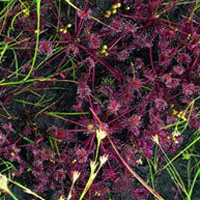Sundew
 © Martin Wall
© Martin WallParts Used & Where Grown
These carnivorous plants have their primary origins in East Africa and Madagascar but are cultivated throughout the world. The main species originally used in cough preparations in Germany, D. rotundifolia, D. intermedia and D. anglica, are now rarely used currently due to threat of extinction. Instead, D. ramentacea and other Drosera species from Australia are employed. Herbal medicine preparations are made primarily from the roots, flowers, and fruit-like capsules.1
- Reliable and relatively consistent scientific data showing a substantial health benefit.
- Contradictory, insufficient, or preliminary studies suggesting a health benefit or minimal health benefit.
- For an herb, supported by traditional use but minimal or no scientific evidence. For a supplement, little scientific support.
Our proprietary “Star-Rating” system was developed to help you easily understand the amount of scientific support behind each supplement in relation to a specific health condition. While there is no way to predict whether a vitamin, mineral, or herb will successfully treat or prevent associated health conditions, our unique ratings tell you how well these supplements are understood by the medical community, and whether studies have found them to be effective for other people.
For over a decade, our team has combed through thousands of research articles published in reputable journals. To help you make educated decisions, and to better understand controversial or confusing supplements, our medical experts have digested the science into these three easy-to-follow ratings. We hope this provides you with a helpful resource to make informed decisions towards your health and well-being.
This supplement has been used in connection with the following health conditions:
| Used for | Amount | Why |
|---|---|---|
Cough | Refer to label instructions | Sundew has a long history of use for treating coughs and has been shown in one study to have cough-relieving abilities. |
Traditional Use (May Not Be Supported by Scientific Studies)
The historical use of sundew is similar to its use in modern herbal medicine. In 1685, Johann Schroder wrote in his book, The Apothecary or a Treasure Chest of Valuable Medicines, that sundew was a beneficial herb that “cures lung ailments and cures coughs.” Sundew tea was specifically recommended in Europe by herbalists for dry coughs, bronchitis, whooping cough, asthma, and “bronchial cramps.”2
Copyright © 2026 TraceGains, Inc. All rights reserved.
Learn more about TraceGains, the company.
The information presented by TraceGains is for informational purposes only. It is based on scientific studies (human, animal, or in vitro), clinical experience, or traditional usage as cited in each article. The results reported may not necessarily occur in all individuals. Self-treatment is not recommended for life-threatening conditions that require medical treatment under a doctor's care. For many of the conditions discussed, treatment with prescription or over the counter medication is also available. Consult your doctor, practitioner, and/or pharmacist for any health problem and before using any supplements or before making any changes in prescribed medications. Information expires December 2026.








